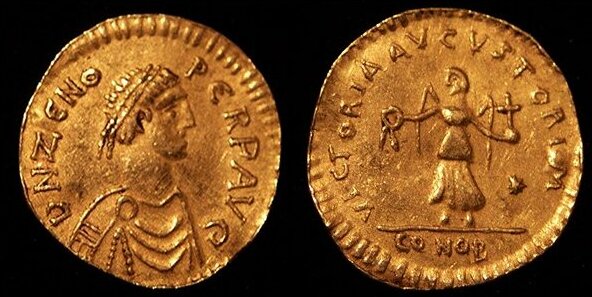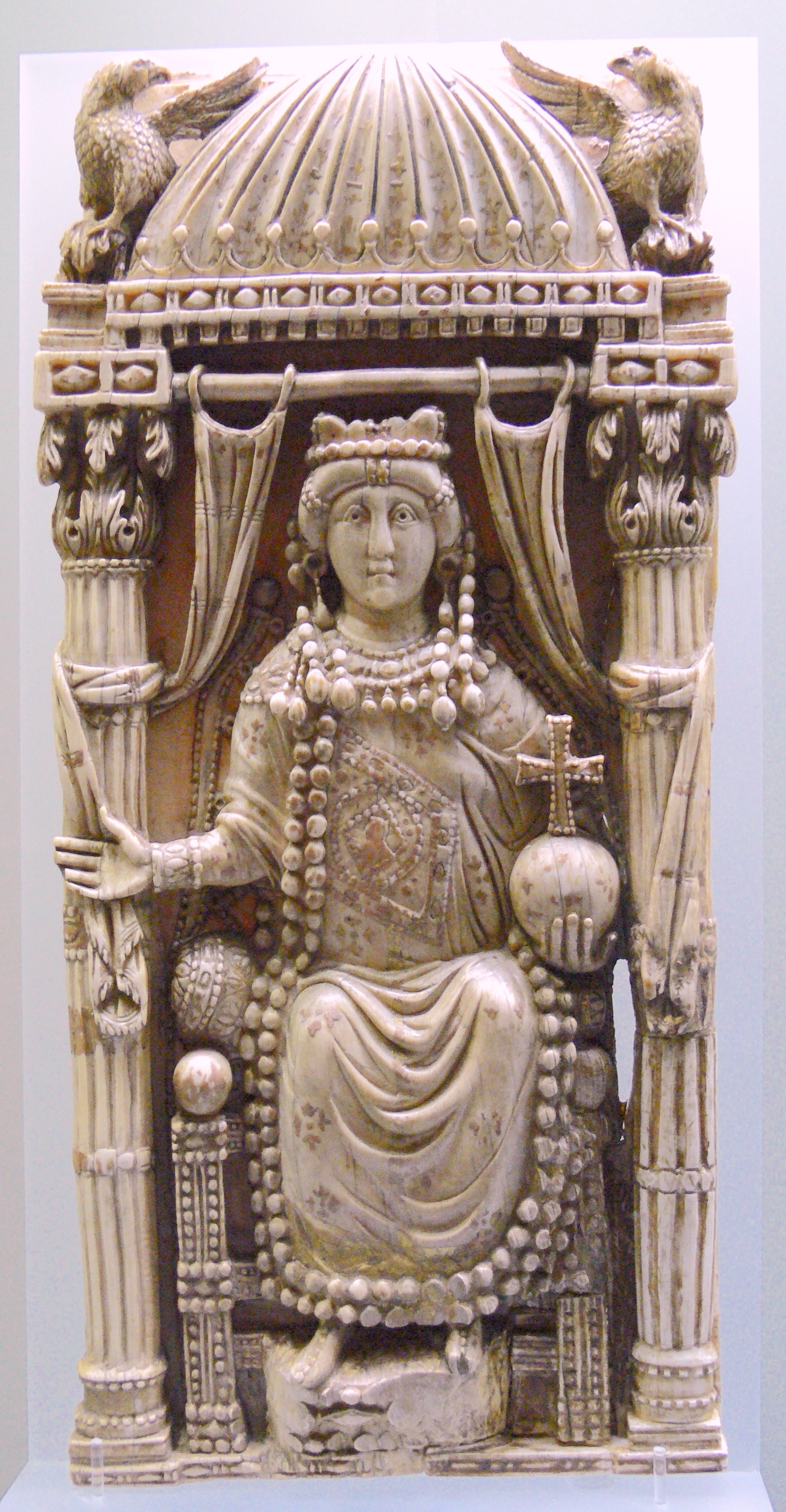|
Trocundes
Flavius Appalius Illus Trocundes ( Greek: Τρόκονδος, died 485) was a general of the Eastern Roman Empire, involved in the rise and fall of Emperor Basiliscus and the rebellion against Emperor Zeno. Trocundes was the brother of Illus, another Roman general. Both of them were from the region of Isauria. Biography Support and betrayal of Basiliscus In 475, the Eastern Roman Emperor Zeno, successor of Emperor Leo I, was deposed by Basiliscus, the brother of Leo's widow Verina. Zeno, expelled from Constantinople, fled to the mountains of Isauria, his home country. Basiliscus sent to chase him two of his generals, the brothers Trocundes and Illus, who were both of Isaurian origin. They defeated the ex-Emperor in July 476, and blocked him on a hill called "Constantinople" by local populations. While Illus and Trocundes besieged Zeno, Basiliscus was losing the support of the aristocracy and the Church in the capital because of his religious position; he also lost Illu ... [...More Info...] [...Related Items...] OR: [Wikipedia] [Google] [Baidu] |
Illus
Flavius Illus ( grc-gre, Ἴλλους or Ἰλλοῦς; died 488) was a Roman general, who played an important role in the reigns of the eastern emperors Zeno and Basiliscus. Illus supported the revolt of Basiliscus against Zeno, then switched sides, supporting the return of Zeno (475-476). Illus served Zeno well, defeating the usurper Marcianus, but came into conflict with the dowager empress Verina, and supported the revolt of Leontius. This rebellion failed and Illus was killed. Origins Illus ( grc-gre, Ἴλλους or ) was an Isaurian, but the time and place of his birth are unknown; he had a brother, called Trocundes. Illus is said to have held various offices under the Emperor Leo I (457—474), and to have been an intimate friend of Zeno, apparently before his accession. John Malalas considered Illus an uncle of Zeno. However, we first read of him in Zeno's reign, at a time during which he was hostile to Zeno. Under Basiliscus Basiliscus, brother of the dow ... [...More Info...] [...Related Items...] OR: [Wikipedia] [Google] [Baidu] |
Zeno (emperor)
Zeno (; grc-gre, Ζήνων, Zénōn; c. 425 – 9 April 491) was Eastern Roman emperor from 474 to 475 and again from 476 to 491. Domestic revolts and religious dissension plagued his reign, which nevertheless succeeded to some extent in foreign issues. His reign saw the end of the Western Roman Empire following the deposition of Romulus Augustus and the death of Julius Nepos, but he was credited with contributing much to stabilising the Eastern Empire. In ecclesiastical history, Zeno is associated with the '' Henotikon'' or "instrument of union", promulgated by him and signed by all the Eastern bishops, with the design of solving the monophysite controversy. The Henotikon was widely unpopular and eventually abandoned under Justin I. Biography Rise to power Early life Zeno's original name was Tarasis, and more accurately ''Tarasikodissa'' in his native Isaurian language ( la, Trascalissaeus).The sources call him "Tarasicodissa Rousombladadiotes", and for this rea ... [...More Info...] [...Related Items...] OR: [Wikipedia] [Google] [Baidu] |
Basiliscus
Basiliscus ( grc-gre, Βασιλίσκος, Basilískos; died 476/477) was Eastern Roman emperor from 9 January 475 to August 476. He became in 464, under his brother-in-law, Emperor Leo (457–474). Basiliscus commanded the army for an invasion of the Vandal Kingdom in 468, which was defeated at the Battle of Cape Bon. There were accusations at the time that Basiliscus was bribed by Aspar, the ; many historians dismiss this, instead concluding that Basiliscus was either incompetent or foolish for accepting Vandal King Gaiseric's offer of a truce, which the latter used to construct fireships. Basiliscus's defeat cost the Eastern Empire of gold, causing the empire to hover above bankruptcy for 30 years. When Basiliscus returned to Constantinople, he sought refuge in the Church of St. Sophia. His sister, Empress Verina, secured him a pardon and he left the church to retire in Neapolis. When Emperor Leo died in 474, his grandson Emperor Leo II (474) took power, but soon ... [...More Info...] [...Related Items...] OR: [Wikipedia] [Google] [Baidu] |
Anicius Acilius Aginantius Faustus
Anicius Acilius Aginantius (or Aginatius) Faustus ( 483–508), also known as Faustus ''albus'' ("white"), was a Roman politician under Odoacer's rule. His brothers included Rufius Achilius Maecius Placidus, and Rufius Achilius Sividius. Life Faustus' career is attested by two inscriptions on seats of the Colosseum. He is attested as ''praefectus urbi'' of Rome in an inscription celebrating his work in restoring an image of Minerva damaged by a falling roof during a riot. The riot can be identified with the civil war that led to the deposition and death of Emperor Anthemius in 472, while the restoration could have been performed under Odoacer, but before 483. In 483 he was appointed consul, without colleague. It is probable that he was not recognised by the Eastern court. In 502-503 he could have been appointed ''praefectus urbi'' for the second time. In those years he was contacted by Magnus Felix Ennodius to be appointed ''advocatus fisci'' in Liguria. Ennodius wrote him al ... [...More Info...] [...Related Items...] OR: [Wikipedia] [Google] [Baidu] |
Late Greek
Late Greek refers to writings in the Greek language in Late Antiquity and the Early Byzantine period; and in other words, from about the late 2nd century AD until about the late 7th century AD.See the definitions of "Late Greek" aDictionary.comanTheFreeDictionary.com Those two websites have the ''American Heritage Dictionary'', the ''Random House Dictionary'', and the ''Collins English Dictionary''. Their definitions are approximately the same. At the dictionary aMerriam-Webster.comthe definition of "Late Greek" is "the Greek language as used in the third to sixth centuries", which is a considerably narrower time-period than what is in the other dictionaries. The intellectual center of Late Greek was Alexandria in Egypt. Alexandria came under Arabic rule starting in the 640s AD, which is sometimes taken as the ending-point of the Late Greek period. In terms purely of linguistics and language style, writings in Late Greek were conservative, whereas style began to change during the 8t ... [...More Info...] [...Related Items...] OR: [Wikipedia] [Google] [Baidu] |
Dictionary Of Greek And Roman Biography And Mythology
The ''Dictionary of Greek and Roman Biography and Mythology'' (1849, originally published 1844 under a slightly different title) is an encyclopedia/biographical dictionary. Edited by William Smith, the dictionary spans three volumes and 3,700 pages. It is a classic work of 19th-century lexicography. The work is a companion to Smith's '' Dictionary of Greek and Roman Antiquities'' and ''Dictionary of Greek and Roman Geography''. Authors and scope The work lists thirty-five authors in addition to the editor, who was also the author of the unsigned articles. The other authors were classical scholars, primarily from Oxford, Cambridge, Rugby School, and the University of Bonn, but some were from other institutions. Many of the mythological entries were the work of the German expatriate Leonhard Schmitz, who helped to popularise German classical scholarship in Britain. With respect to biographies, Smith intended to be comprehensive. In the preface, he writes: Much of the v ... [...More Info...] [...Related Items...] OR: [Wikipedia] [Google] [Baidu] |
Imperial Roman Consuls
Imperial is that which relates to an empire, emperor, or imperialism. Imperial or The Imperial may also refer to: Places United States * Imperial, California * Imperial, Missouri * Imperial, Nebraska * Imperial, Pennsylvania * Imperial, Texas * Imperial, West Virginia * Imperial, Virginia * Imperial County, California * Imperial Valley, California * Imperial Beach, California Elsewhere * Imperial (Madrid), an administrative neighborhood in Spain * Imperial, Saskatchewan, a town in Canada Buildings * Imperial Apartments, a building in Brooklyn, New York * Imperial City, Huế, a palace in Huế, Vietnam * Imperial Palace (other) * Imperial Towers, a group of lighthouses on Lake Huron, Canada * The Imperial (Mumbai), a skyscraper apartment complex in India Animals and plants * '' Cheritra'' or imperial, a genus of butterfly Architecture, design, and fashion * Imperial, a luggage case for the top of a coach * Imperial, the top, roof or second-storey compartm ... [...More Info...] [...Related Items...] OR: [Wikipedia] [Google] [Baidu] |
Executed Byzantine People
Capital punishment, also known as the death penalty, is the state-sanctioned practice of deliberately killing a person as a punishment for an actual or supposed crime, usually following an authorized, rule-governed process to conclude that the person is responsible for violating norms that warrant said punishment. The sentence ordering that an offender is to be punished in such a manner is known as a death sentence, and the act of carrying out the sentence is known as an execution. A prisoner who has been sentenced to death and awaits execution is ''condemned'' and is commonly referred to as being "on death row". Crimes that are punishable by death are known as ''capital crimes'', ''capital offences'', or ''capital felonies'', and vary depending on the jurisdiction, but commonly include serious crimes against the person, such as murder, mass murder, aggravated cases of rape (often including child sexual abuse), terrorism, aircraft hijacking, war crimes, crimes against h ... [...More Info...] [...Related Items...] OR: [Wikipedia] [Google] [Baidu] |
Byzantine Generals
A Byzantine fault (also Byzantine generals problem, interactive consistency, source congruency, error avalanche, Byzantine agreement problem, and Byzantine failure) is a condition of a computer system, particularly distributed computing systems, where components may fail and there is imperfect information on whether a component has failed. The term takes its name from an allegory, the "Byzantine generals problem", developed to describe a situation in which, in order to avoid catastrophic failure of the system, the system's actors must agree on a concerted strategy, but some of these actors are unreliable. In a Byzantine fault, a component such as a server can inconsistently appear both failed and functioning to failure-detection systems, presenting different symptoms to different observers. It is difficult for the other components to declare it failed and shut it out of the network, because they need to first reach a consensus regarding which component has failed in the first p ... [...More Info...] [...Related Items...] OR: [Wikipedia] [Google] [Baidu] |
5th-century Executions By The Byzantine Empire
The 5th century is the time period from 401 ( CDI) through 500 ( D) '' Anno Domini'' (AD) or Common Era (CE) in the Julian calendar. The 5th century is noted for being a period of migration and political instability throughout Eurasia. It saw the collapse of the Western Roman Empire, which came to an end in 476 AD. This empire had been ruled by a succession of weak emperors, with the real political might being increasingly concentrated among military leaders. Internal instability allowed a Visigoth army to reach and ransack Rome in 410. Some recovery took place during the following decades, but the Western Empire received another serious blow when a second foreign group, the Vandals, occupied Carthage, capital of an extremely important province in Africa. Attempts to retake the province were interrupted by the invasion of the Huns under Attila. After Attila's defeat, both Eastern and Western empires joined forces for a final assault on Vandal North Africa, but this campai ... [...More Info...] [...Related Items...] OR: [Wikipedia] [Google] [Baidu] |
5th-century Roman Consuls
The 5th century is the time period from 401 ( CDI) through 500 ( D) ''Anno Domini'' (AD) or Common Era (CE) in the Julian calendar. The 5th century is noted for being a period of migration and political instability throughout Eurasia. It saw the collapse of the Western Roman Empire, which came to an end in 476 AD. This empire had been ruled by a succession of weak emperors, with the real political might being increasingly concentrated among military leaders. Internal instability allowed a Visigoth army to reach and ransack Rome in 410. Some recovery took place during the following decades, but the Western Empire received another serious blow when a second foreign group, the Vandals, occupied Carthage, capital of an extremely important province in Africa. Attempts to retake the province were interrupted by the invasion of the Huns under Attila. After Attila's defeat, both Eastern and Western empires joined forces for a final assault on Vandal North Africa, but this campaign was a sp ... [...More Info...] [...Related Items...] OR: [Wikipedia] [Google] [Baidu] |







